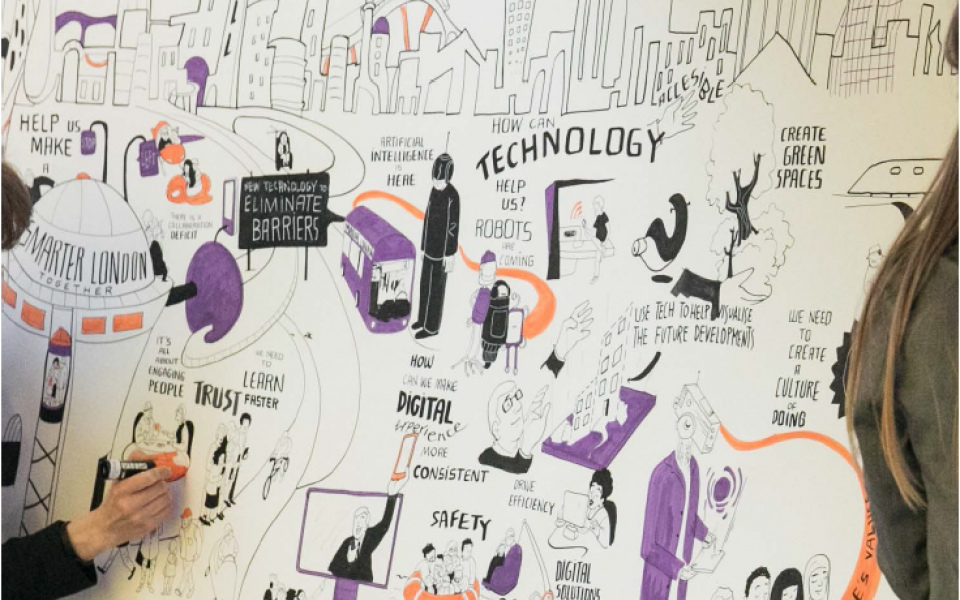First look: London’s roadmap to becoming the world’s smartest city

Mayor of London Sadiq Khan will today reveal more details around his plan to make London the world’s smartest city, as chief digital officer Theo Blackwell gives City A.M. the inside scoop.
The Smarter London Together roadmap, which will be discussed in full tomorrow in collaboration with Transport for London (TfL), is proposing more than 20 new initiatives which use technology to tackle some of the capital’s most pressing issues, including air quality, urban design and internet connectivity.
“My job is less about digital economy, and more about making our city smarter,” said Blackwell, speaking to City A.M. alongside an advanced look at the mayor’s plans.
“To that end we’re launching a new roadmap for the city, which updates the initial Smart London plan from 2013. We need to take London to the next level in terms of how we use data to the benefit of our citizens.”
Since Blackwell’s appointment in September last year, London’s first chief digital officer has been on a mission of discovery about how government, the city’s 33 boroughs and the NHS were approaching digital transformation, and what its citizens might expect from new technology.
The mayor’s office conducted a listening tour of over 80 events starting in January, and ending with public consultation done in April on people’s views about the use of their data and who they might trust with it. Off the back of that, Blackwell believes it revealed what Londoner’s believe to be acceptable data collection, and how they can use it to lay the foundations for data that will improve services across the city.
The roadmap broadly focuses its initiatives into five key missions:
- To create more user-designed services by developing new user inclusion tactics, and promoting diversity in tech to address inequality. Blackwell plans to launch the Civic Innovation Challenge, a London-specific tech hub funded by the mayor’s office to sponsor startups in tech-led urban design;
- To strike a new deal for city data through the launch of the London Office for Data Analytics (LODA) programme, which will see the development of a city-wide cybersecurity strategy and support an open ecosystem to increase data transparency;
- To foster world-class gigabit connectivity and smarter streets via the Connected London programme. This will involve proposing new planning powers like requiring full fibre connectivity for all new homes, enhancing public wifi and supporting the evolution of a 5G network to increase competition and choice between providers;
- To enhance digital leadership and skills through support for training in the digital talent pipeline and developing workforce capability to secure London’s future as the tech capital of Europe;
- To improve city-wide collaboration by creating cornerstone institutions, which will sponsor common capabilities and standards for future innovation. Blackwell said the mayor’s office will be teaming up with the EU and the Fire Brigade to ensure all data that is held locked up across the boroughs and City Hall is shared for the benefit of the city.
“The difference in this approach is that it has a different way of bringing citizens into the design,” Blackwell continued.
“For example, our new roadmap will be published on Trello, so people will be able to see what we’re doing in real-time and discuss with us how things are developing.”
Aside from working on the above, the mayor’s office is also exploring initiatives on autonomous vehicles, using artificial intelligence as a key part of its business model and increasing tech beds across the city where entrepreneurs are encouraged to try, even if they might sometimes fail.
Blackwell said:
The approach here is less about gadgets, and more about creating the foundations for innovation that has not been considered yet. What innovators tell us is that they want to have access to and collaboration with people with large volumes of quality data, so that they can understand problems better and come up with viable solutions to them.
Examples of the city’s new so-called lean-in approach towards tech can be seen as recently as last week, when TfL launched a new campaign to automate bus passenger number tracking. The trial campaign hopes to give Londoners abilities like knowing if their bus will be full before it arrives, as well as improve real-time travel updates.
However such advances in technology cannot come without disruption, or pushback from big players. Blackwell added:
One major challenge I’m expecting on data is I think some of the utilities have a long way to go on the way we share data among institutions, for example Thames Water and national electric companies.
But we need to ensure data is shared effectively from utilities firms, to ensure that roadworks are done in a coordinated fashion to minimise disruption, investment works properly, that there’s accountability to the public and to help people pay their bills who are suffering through poverty.
Getting big telecommunications firms around the table with local authorities will also be difficult, as a common complaint is that there’s no universal approach to dealing with each borough when needing to dig up a street to make way for new innovation.
At the very least, Blackwell said, there’s a national debate to be had around data and privatised utilities firms, if more powers will be needed to make sure that they share their data openly and effectively.